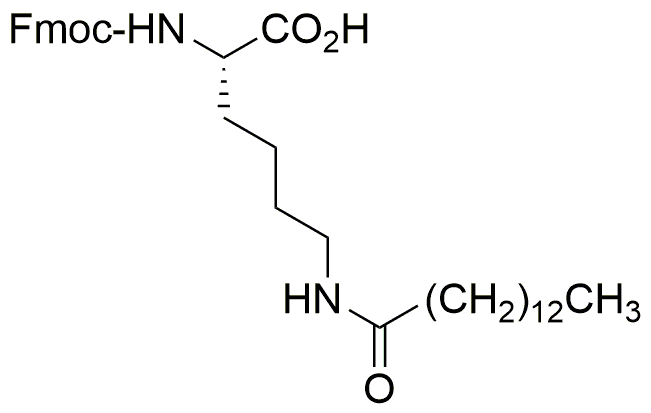Na -Fmoc- Ne -tetradecanoyl-L-lysine is widely utilized in research focused on:
- Peptide Synthesis: This compound serves as a crucial building block in the synthesis of peptides, particularly in solid-phase peptide synthesis. Its protective Fmoc group allows for selective deprotection, facilitating the assembly of complex peptide sequences.
- Drug Development: In pharmaceutical research, it is used to create peptide-based drugs. The tetradecanoyl modification enhances membrane permeability, making it useful for developing therapeutics that require efficient cellular uptake.
- Bioconjugation: This chemical is employed in bioconjugation processes, where it helps attach peptides to various biomolecules. This application is vital in creating targeted drug delivery systems and improving the efficacy of therapeutic agents.
- Protein Engineering: Researchers utilize this compound in protein engineering to modify lysine residues, which can alter protein function and stability. This is particularly beneficial in the development of novel enzymes or antibodies.
- Cosmetic Formulations: The compound finds application in the cosmetic industry, where it is used in formulations aimed at enhancing skin penetration of active ingredients, thereby improving the effectiveness of skincare products.
General Information
Properties
Safety and Regulations
Applications
Na -Fmoc- Ne -tetradecanoyl-L-lysine is widely utilized in research focused on:
- Peptide Synthesis: This compound serves as a crucial building block in the synthesis of peptides, particularly in solid-phase peptide synthesis. Its protective Fmoc group allows for selective deprotection, facilitating the assembly of complex peptide sequences.
- Drug Development: In pharmaceutical research, it is used to create peptide-based drugs. The tetradecanoyl modification enhances membrane permeability, making it useful for developing therapeutics that require efficient cellular uptake.
- Bioconjugation: This chemical is employed in bioconjugation processes, where it helps attach peptides to various biomolecules. This application is vital in creating targeted drug delivery systems and improving the efficacy of therapeutic agents.
- Protein Engineering: Researchers utilize this compound in protein engineering to modify lysine residues, which can alter protein function and stability. This is particularly beneficial in the development of novel enzymes or antibodies.
- Cosmetic Formulations: The compound finds application in the cosmetic industry, where it is used in formulations aimed at enhancing skin penetration of active ingredients, thereby improving the effectiveness of skincare products.
Documents
Safety Data Sheets (SDS)
The SDS provides comprehensive safety information on handling, storage, and disposal of the product.
Product Specification (PS)
The PS provides a comprehensive breakdown of the product’s properties, including chemical composition, physical state, purity, and storage requirements. It also details acceptable quality ranges and the product's intended applications.
Certificates of Analysis (COA)
Search for Certificates of Analysis (COA) by entering the products Lot Number. Lot and Batch Numbers can be found on a product’s label following the words ‘Lot’ or ‘Batch’.
Número de catálogo
Número de lote/lote
Certificates Of Origin (COO)
This COO confirms the country where the product was manufactured, and also details the materials and components used in it and whether it is derived from natural, synthetic, or other specific sources. This certificate may be required for customs, trade, and regulatory compliance.
Número de catálogo
Número de lote/lote
Safety Data Sheets (SDS)
The SDS provides comprehensive safety information on handling, storage, and disposal of the product.
DownloadProduct Specification (PS)
The PS provides a comprehensive breakdown of the product’s properties, including chemical composition, physical state, purity, and storage requirements. It also details acceptable quality ranges and the product's intended applications.
DownloadCertificates of Analysis (COA)
Search for Certificates of Analysis (COA) by entering the products Lot Number. Lot and Batch Numbers can be found on a product’s label following the words ‘Lot’ or ‘Batch’.
Número de catálogo
Número de lote/lote
Certificates Of Origin (COO)
This COO confirms the country where the product was manufactured, and also details the materials and components used in it and whether it is derived from natural, synthetic, or other specific sources. This certificate may be required for customs, trade, and regulatory compliance.


